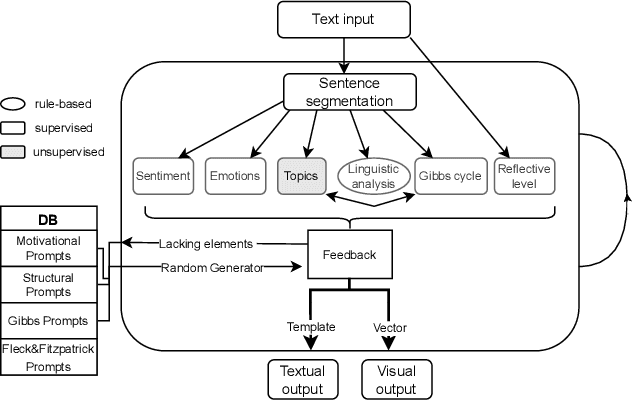Fritz Cremer
PapagAI:Automated Feedback for Reflective Essays
Jul 10, 2023



Abstract:Written reflective practice is a regular exercise pre-service teachers perform during their higher education. Usually, their lecturers are expected to provide individual feedback, which can be a challenging task to perform on a regular basis. In this paper, we present the first open-source automated feedback tool based on didactic theory and implemented as a hybrid AI system. We describe the components and discuss the advantages and disadvantages of our system compared to the state-of-art generative large language models. The main objective of our work is to enable better learning outcomes for students and to complement the teaching activities of lecturers.
Rewarding Chatbots for Real-World Engagement with Millions of Users
Mar 10, 2023Abstract:The emergence of pretrained large language models has led to the deployment of a range of social chatbots for chitchat. Although these chatbots demonstrate language ability and fluency, they are not guaranteed to be engaging and can struggle to retain users. This work investigates the development of social chatbots that prioritize user engagement to enhance retention, specifically examining the use of human feedback to efficiently develop highly engaging chatbots. The proposed approach uses automatic pseudo-labels collected from user interactions to train a reward model that can be used to reject low-scoring sample responses generated by the chatbot model at inference time. Intuitive evaluation metrics, such as mean conversation length (MCL), are introduced as proxies to measure the level of engagement of deployed chatbots. A/B testing on groups of 10,000 new daily chatbot users on the Chai Research platform shows that this approach increases the MCL by up to 70%, which translates to a more than 30% increase in user retention for a GPT-J 6B model. Future work aims to use the reward model to realise a data fly-wheel, where the latest user conversations can be used to alternately fine-tune the language model and the reward model.
 Add to Chrome
Add to Chrome Add to Firefox
Add to Firefox Add to Edge
Add to Edge